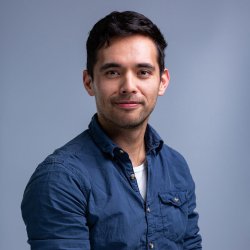PGR IAA Officer Spotlight - Michael Slade
Michael Slade, a PGR from the Department of Politics has been helping us capture the outputs and impact of Surrey's EPSRC IAA projects. Let hear about his experience...
Dr Michael Short, one of our IAA Commercialisation Fellows and a Lecturer from Chemical & Process Engineering, helped us manage this project.
Tell us about yourself, why you applied for this role, and what you expected to gain
At the time when I applied for the role I was going into the final year of my PhD. I am interested in how we can build comparative models of institutional configurations across different states. Specifically, how comparative models of institutional configurations could help Political Science better understand the developmental and political challenges faced across regions.
When I applied for the role, I was interested in finding out more about the process of grant writing, what kinds of projects are considered innovative, and how projects develop once funding is awarded. Part of the reason why I was interested in the role is because innovation is not a topic that is widely discussed within the social sciences. The other part is that I am personally interested in the intersection between research, technology, and commercialisation within higher education. Particularly how cutting-edge research and ideas can bring about social good.
I am personally interested in the intersection between research, technology, and commercialisation within higher education. Particularly how cutting-edge research and ideas can bring about social goodMicheal Slade, Postgraduate Research Student

How would you define ‘innovation’, how does it fit within an academic environment, and how is it relevant? Has your definition changed since working in this role?
I would define innovation as the space where bleeding edge research meets motivation, meets execution, meets opportunity.
The academic institutions are arguably the start of this casual chain as they are the knowledge hubs that produce bleeding edge research that we are yet to test. I think motivation is an important part of taking that idea forward from the concept to an actual executable project that is proposed as part of a grant application.
I would say that opportunity was not something that I considered as much before undertaking my role. However, what I soon learnt is that the timing of coming to market with an idea is crucial part of if it will be a success. Too early and there might be no perceived need for your product, too late could mean that competitors have already flooded the market of have the backing of all the major partners. It’s a fine balance.
What do you think are the biggest barriers to innovation for researchers at Surrey, in particular within your Dpt or Faculty, and how do you suggest we address these?
I feel that within the social sciences the process of defining, proposing, and delivering impactful/commercially successful projects is not particularly clear. While undertaking research might be new and interesting the term innovation is never quite used. However, having now spent some time working within the innovation team I can certainly say that I have a better understanding of the breath of activities that can be considered innovative. From projects that promote policy change to the development of new inventions.
How has your experience in the role changed your approach to innovation?
It has certainly broadened my view of the range of projects that could be said to be innovative. Equally, my work with current and previous principle investigators has taught me a great deal about the importance of engaging colleagues from across departments to support with the successful delivery of projects.
What things have you learned? Was anything unexpected?
- A project is only as good as the team around it. The engagement of teams of researchers and commercial partners are core to the success of innovative projects
- Failing fast is a good thing. Better to spend £3,000 of a demonstrator and scrap it that spend £30,000 on unviable product
- There is something to learn from every research project. When things don’t go to plan there is always a chance to learn from the experience or pivot to a new project
- Innovation is not a linear exercise
What would you say to a prospective ECR considering applying to work with the technology transfer team?
Do it! Working alongside the Innovation team was one of the most productive and eye-opening elements of doing my PhD. I had the opportunity to speak to principal investigators and gain a deeper understanding of the range of challenges and successes they experienced accelerating their research and delivering impactful projects.
Question | 😱 | 😢 | 😐 | 🤓 | 🔥 |
|---|---|---|---|---|---|
Before your IAA Officer role, what was your practical understanding and application of impact, knowledge exchange and commercialisation activities? |
| ❌ |
|
| |
Before your IAA Officer role, what was your understanding of IP? | ❌ |
|
|
|
|
Before your IAA Officer role, what was your awareness for the relevance of innovation to the academic career? |
| ❌ |
|
|
|
Overall, how do you feel about Innovation now? | ❌ | ➡ | ➡ | ✅ |
|

